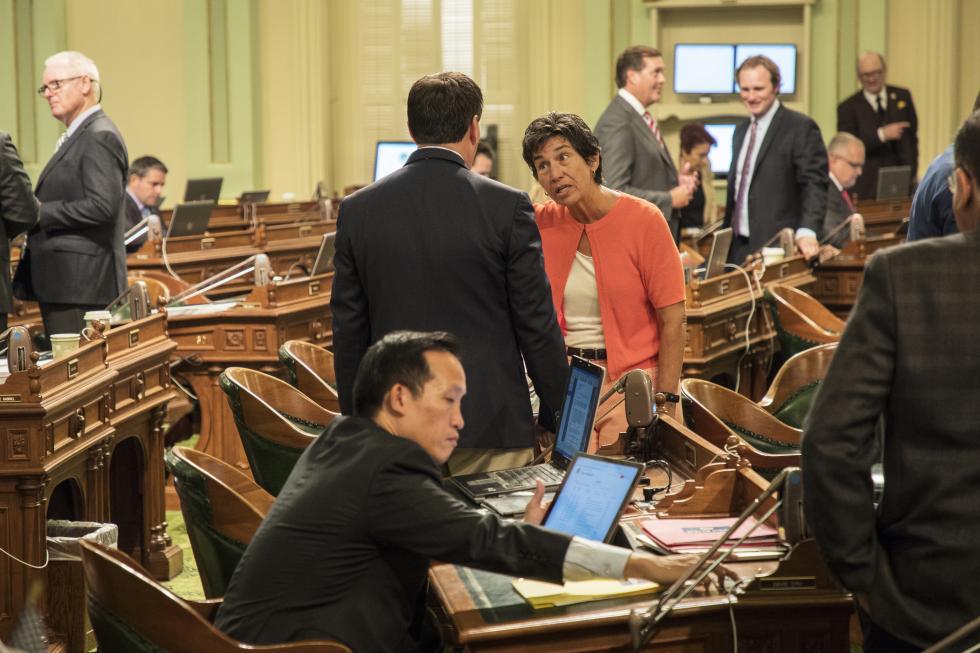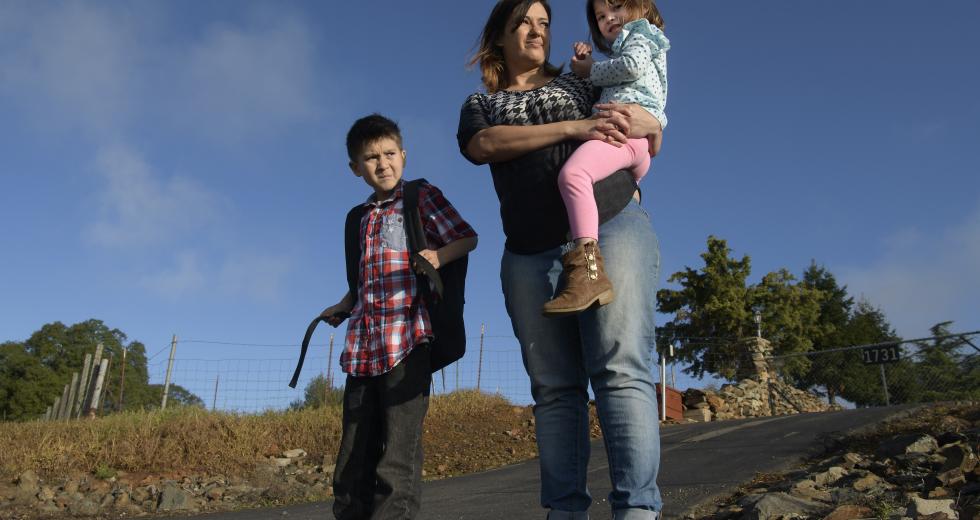Jeanny Morris had a 1-year-old baby and a resume of dead-end retail jobs when she enrolled in the Marinello Schools of Beauty cosmetology program in 2012. She used her welfare benefits to pay for transportation to and from school where, she says, staff pressured her to take out student loans to pay for supplies they had previously promised to provide, such as books, drapes and combs.
Classes intended to prepare students to pass the state’s licensing exam were chaotic, Morris said, neglecting basic skills such as giving perms. Teachers often left students alone to watch YouTube videos. Fights broke out in the parking lot.
“It was like [the movie] Dangerous Minds, minus the good teacher,” the El Dorado Hills resident said.
Morris graduated from the 10-month program with more than $22,000 in student debt, but today is unemployed, saying she’s been unable to find work that pays more than minimum wage.
“I made more money without my cosmetology license than I do with it,” she said.
A federal regulation called the gainful employment rule aims to protect students like Morris from incurring large debts for career education that doesn’t pay off. But with the Trump administration vowing to repeal the Obama-era rule, California could soon put in place its own law requiring vocational programs to demonstrate that they can place students in jobs that pay well enough to cover their loans.
Bills by Assemblyman David Chiu, seated, and Assemblywoman Susan
Eggman, center, would tighten state regulations on for-profit
colleges as the Trump administration rolls back Obama-era rules.
Photo by Robbie Short for CALmatters

Representatives of for-profit colleges, which would likely be most impacted by the first-of-its-kind legislation, decry it as impractical and say it would punish schools for results that are beyond their control. They’re fighting it and a related proposal to bar private colleges from deriving more than 85 percent of their tuition revenue from government financial aid programs. Both bills passed in the Assembly’s higher education committee Tuesday.
“Gainful employment has been a failure,” said Robert Johnson, executive director of the California Association of Private Postsecondary Schools. “It assumes everyone goes to work 40 hours a week, they don’t get into a car crash, they don’t go to jail. That’s crazy to put that [responsibility] back on the school.”
Consumer advocates, however, see the proposals as necessary restraints on a for-profit career training industry that relies heavily on public money but has been plagued by poor outcomes and, in some cases, outright fraud. Students at for-profit colleges, which often focus on vocational training, are nearly four times as likely to default on a student loan as their counterparts at community colleges, a Brookings Institution analysis of Department of Education data found.
Under the gainful employment rule proposed by Assemblyman David Chiu, career education programs in which graduates spend more than 8 percent of their total earnings on student loans would not be able to increase the number of new California residents they enroll from year to year. If average student loan payments exceed 12 percent of graduates’ incomes, the program would be banned from enrolling Californians at all.
The standards mirror those set by the Obama administration in 2014, when it threatened to withhold federal financial aid dollars from poor-performing programs. Education Secretary Betsy DeVos has said she plans to scrap the rule and has stopped publishing schools’ debt-to-earnings data.
“The Trump administration has fueled the growth of predatory schools and abandoned safeguards,” said Chiu, a San Francisco Democrat. “We have to protect our students by whatever means we can.”
Scandal-plagued schools
While it’s unclear how many schools would be affected by Chiu’s bill, at least 266 California programs failed to pass the federal debt-to-earnings test in 2015, the last year for which data were released. All but four of the programs were at for-profit schools.
At Marinello’s Moreno Valley campus, cosmetology graduates were earning an average of just under $11,000 per year and paying more than $1,300 of that in student loans. The school’s 56 campuses shut down in 2016 after federal regulators cut them off from receiving financial aid, finding the school had mismanaged the funds.
The list of failing and near-failing programs also included criminal justice and medical assistant programs at Brightwood College, which abruptly closed its doors last year, displacing thousands of students nationwide. Argosy University, which shuttered last month amid revelations that it had withheld millions in students’ financial aid refunds to pay its expenses, had 24 programs on the list.
The presence of scandal-plagued schools on the list shows that gainful employment data is an early indicator for programs that may be at risk of imploding, said Debbie Cochrane, vice president of The Institute for College Access and Success, a bill sponsor.
“If we don’t have rules in place that would shut the bad actors down or force them to improve, there will be nothing to stop them from proliferating,” she said.
Reputable schools had already begun using the federal gainful employment data to make improvements that would bring them into compliance, Cochrane said. “They were investing in career services, lowering tuition.”
If the bill passes, California could prove a test case for other states that want to develop their own gainful employment rules—a ripple effect that a lobbyist for the national, for-profit University of Phoenix described as a bureaucratic nightmare.
The bill “sets a dangerous precedent that could lead to a patchwork of state-based bills with different debt to earnings as well as different state data sources that will likely…create inconsistent results,” the lobbyist, Scott Govenar, wrote in a letter to lawmakers.
California already collects information on the percentage of students in vocational programs who take out federal student loans. Under the proposed gainful employment rule, California’s Bureau for Private Postsecondary Education would need to find out how much debt those students take on, then compare it with wage data from the state’s Employment Development Department.
Yet the bureau itself has struggled to enforce existing state laws, a recent investigation by CALmatters and the Sacramento Bee found, and is not inspecting schools as often as it is legally required to do.
Veterans call for reform
The gainful employment bill is one of seven introduced by Democratic lawmakers last month in a bid to tighten oversight of for-profit colleges. Veterans groups are lining up in support of another proposal that would limit the schools’ ability to rely on public funding, including students’ GI Bill benefits.
Federal law currently bars for-profit colleges from receiving more than 90 percent of their revenue in public financial aid. But that doesn’t include the generous benefits veteran students receive under the GI bill, which can include tuition, a housing allowance and money for books. Veteran and consumer advocates say the loophole gives for-profit colleges an incentive to target veterans with aggressive and sometimes misleading recruiting.
“It’s a cash cow,” said Ramond Curtis, state policy manager for Veterans Education Success, which is supporting similar bills in Oregon and Maine. “They’ve got a business model around recruiting and defrauding veterans. It has nothing to do with education.”
A 2018 audit by the Department of Veterans Affairs’ Office of the Inspector General found that nearly $474 million was improperly awarded in a single year to for-profit colleges that either didn’t pass program reviews or had used deceptive advertising.
By reducing the amount of financial aid colleges can receive to 85 percent of revenue and including state and GI Bill funds, the legislation by Assemblywoman Susan Eggman could force some schools to close. How many is in dispute: Johnson said about two-thirds of his organization’s membership could shut down if the legislation passes. A spokesperson for the University of Phoenix said it would likely close its brick-and-mortar California campuses, which enroll about 12,000 students.
The Century Foundation, a progressive think tank that supports the bill, estimates 90 percent of for-profit colleges either already comply with the requirements or come close.
The backlash shows how heavily some for-profit colleges depend on public funds. Lobbyists for the colleges argue that the low-income students they serve simply have no other way to pay tuition.
“Apparently, our grave sin is that we enroll people who aren’t rich,” said Johnson.
But proponents of the crackdown say schools that offer effective training would attract at least some investment from individuals and employers. They point to the University of California Extension, which offers flexible courses for adult learners and is self-supporting—though most of its students already have bachelor’s degrees.
“Programs should rely on at least a modest investment of private dollars to ensure that they have value in a market not fully subsidized by taxpayers and veterans,” said Eggman, a Democrat from Stockton who is herself a veteran.
She also noted another provision in the bill that exempts colleges if they spend at least half of their revenue on instruction, as public community colleges must legally do.
This story and other higher education coverage are supported by the College Futures Foundation.
CALmatters.org is a nonprofit, nonpartisan media venture explaining California policies and politics



